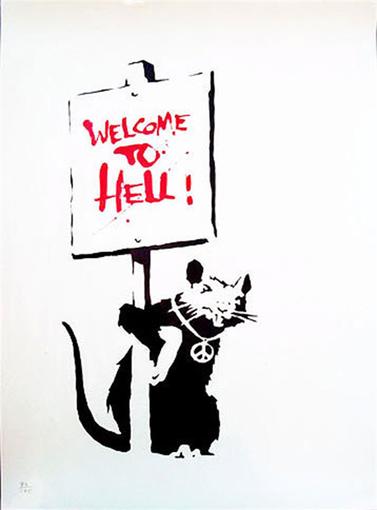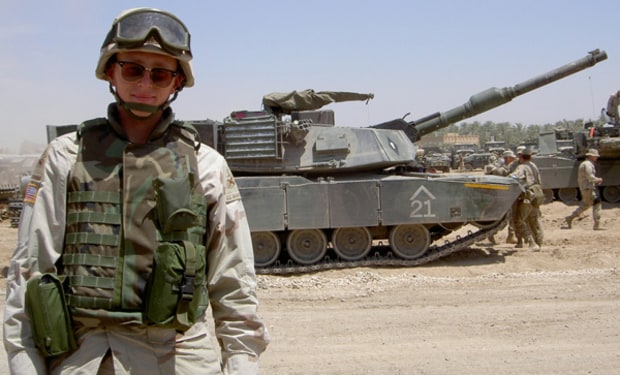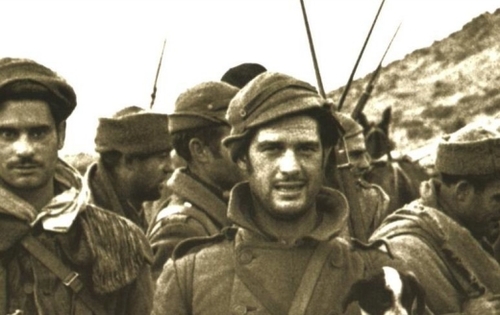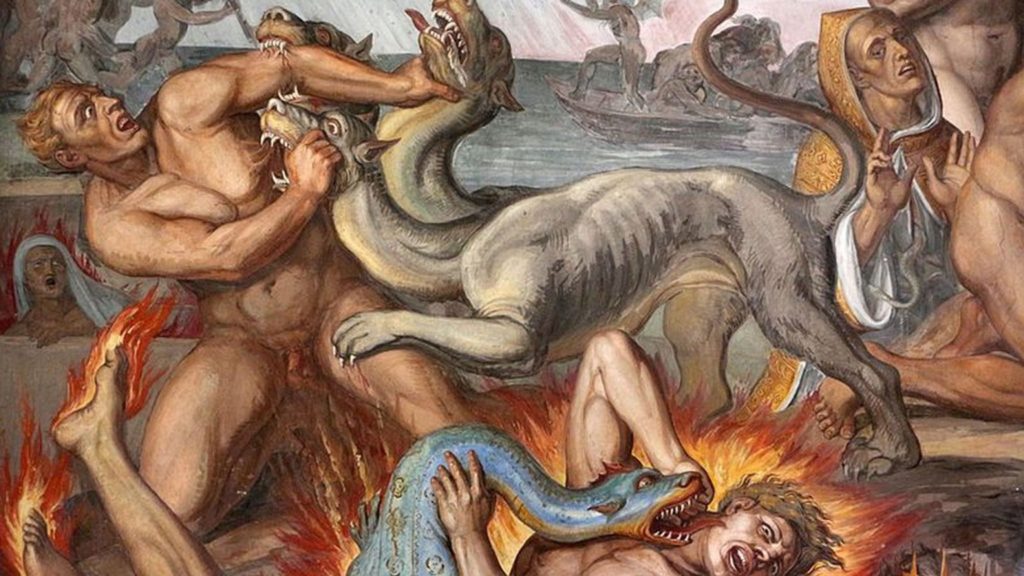Midway upon the journey of our life
I found myself within a forest dark
For the straightforward pathway had been lost.
 Ah me! how hard a thing it is to say
Ah me! how hard a thing it is to say
What was this forest savage, rough, and stern,
Which in the very thought renews the fear.
So bitter is it, death is little more;
But of the good to treat, which there I found,
Speak will I of the other things I saw there.
Dante’s Inferno, Canto I
We begin our descent.
In the first part of our seminar, we will consider four different images of Hell: War, state repression, and two versions of existentialist Angst (one in a world where God is dead versus a contrasting image in a world where He is alive).

I have two goals: I seek to acquaint you with some compelling experiences that we associate with Hell. Because this is a social science seminar, I also want to consider a complex term which, at first glance, doesn’t seem like it should be complex at all: description. What do we mean when we describe something? What does a good description look like? Why do people disagree over an exercise that seems so simple?
From this day onward, I hope you will devour all of the readings on this syllabus. In addition to the required books, please remember to bring copies of each of the assigned readings marked “PRINT” as well as hand-outs to class. You must have the required readings in front of you so we can have a robust discussion.
1. Tuesday, January 11
Discussion Topic: Why is the idea of Hell a significant part of our daily lives? Why do we use the term so frequently?
Today, I will outline my goals and the structure of this course. I will also conduct a class survey.
Assignment: On Thursday, we will begin our discussion of Roy Scranton’s provocative book, War Porn, as well as a short selection from the Catholic Catechism on “Hell.” As you read Scranton’s book, think about the following theme: According to Scranton, “war is hell because . . .” Then, write a brilliant sentence and an equally brilliant follow-up sentence that address this theme. 
The purpose of this exercise is to begin training your mind to think about how you introduce a paper. Thus, please spend a serious amount of time choosing the best sentences. Imagine that your sentences are the introduction to a paragraph. Why would your sentences grab my attention?
Once you have written these sentences, please write a short paragraph (no more than three sentences!) explaining why you decided to take this approach.
This assignment should be typed and double-spaced. NOTE: You should consistently adhere to this rule throughout our course. I’m afraid I won’t be able to read any of your assignments if they aren’t typed and double-spaced.
IMAGE ONE
OUR CONTINUING WAR IN IRAQ I: “War is hell”
2. Thursday, January 13
Discussion Topic: What is Hell? It depends on whom you ask. If we put the Catholic Church and Roy Scranton in the same room, will they understand each other? Will they get along? Will they care?
-
-
-
- Roy Scranton, War Porn Read only pp. 1-126.
- “Hell” according to the Catechism of the Catholic Church: PRINT AND READ
- On PTSD: “War is Hell, and the Hell Rubs Off“
-
-
Today, we start familiarizing ourselves with the terrain of Hell. My personal guarantee: Everything we do as we move through this semester will relate to later segments of the course.
As we begin our readings and discussions, imagine yourself as a collector, picking up different visions of Hell and trying to discern what they are about. Scranton presents us with one image. The Catholic Church provides a different one. We will encounter many more.
Assignment for next Tuesday:
Why did Roy Scranton choose to call his book War Porn? Please write a paragraph of no more than 6 sentences in response to this question. Imagine that your paragraph is the introduction to a long essay on this topic. If you like, feel free to use or modify the sentences you have generated for today’s class.
Think hard about what a great introductory paragraph should do. Please spend lots of time making this paragraph the best one you can imagine writing. Note: Anyone can write a paragraph, but it is a big challenge to write a great one. I challenge you.
Also, please include a question for Roy Scranton’s visit.
3. Tuesday, January 18
Discussion Topic:
Finish reading Roy Scranton’s War Porn
I am particularly interested in two issues: 1) What is war like in all of its manifestations? 2) If someone writes about war, how should he or she go about choosing the appropriate words and sentences to capture the topic in its fullness Keep in mind: You are dealing with the challenge of description). However, I also encourage our discussion leaders to come up with even better questions.
4. Thursday, January 20
Class Visit by the author: Roy Scranton
Roy Scranton, “Back to Baghdad,” Rolling Stone, July 31, 2014 READ

5. Tuesday, January 25
Discussion: Great Writing, Persuasive Criticism
George Orwell was one of the finest stylists in the English language. His works are deceptively easy to read. Most people cannot write like this. I want you to try.
Assignment: Please write a list of the five most important features of great writing. After each feature, write a one-sentence justification for why it is one of the five most important.
For the first half of this section, we will talk about what it means to write the introductory paragraph to a paper. What should it look like? What must it do?
There is a lot of reading for this session. Orwell’s “Politics and the English Language” will be the most important. However, be sure to finish all of the readings below. Each relates to different topics we will cover in this class. We will return to each of them again and again.
What are the features of great writing?
George Orwell, “Politics and the English Language” PRINT AND READ
Famous facsimile (handout)
Mystery facsimile (handout)
“Orwell gets an Apology” READ
What does one go through in trying to become a great writer?
George Orwell, “Why I write” PRINT AND READ
Why is great writing an ethical activity?
Bob Fischer and Nathan Nobis, “Why Writing Better will make you a Better Person”: PRINT AND READ
After you have read the Fischer and Nobis article, ask yourself what their argument has to do with Orwell’s warnings about the political manipulation of language in “Politics and the English Language.” Since we live at a time when, words are frequently distorted by the enemies of truth and basic morality, this article is directly relevant to our lives.
Bring physical copies of all of these articles to class.
6. Thursday, January 27
An excursus. From the twenty-first century to the fourteenth century and back. Our goal in today’s meeting is to see how different depictions of Hell reflect the circumstances in which they are created.
Learning is as much about looking at something as about reading and listening.
We will meet for class in the Special Collections Room, first floor of Hesburgh Library. Notre Dame is a powerhouse in Italian studies and has one of the finest collections of Dante’s Divine Comedy. Tracy Bergstrom, the library’s expert on this collection, will introduce us to visual depictions of Dante’s Inferno.
 Before we meet, read the following three Cantos closely. Also, read the notes so you know what’s going on. The better you understand these Cantos, the easier it will be for you to interpret the artistic depictions that we will see.
Before we meet, read the following three Cantos closely. Also, read the notes so you know what’s going on. The better you understand these Cantos, the easier it will be for you to interpret the artistic depictions that we will see.
Canto I: PRINT AND READ
Background Notes: READ
Canto Canto XXIX (plague-like victims): PRINT AND READ
Background Notes: READ
Canto XXXIV (Lucifer): PRINT AND READ
Background Notes: READ
READ: Is Hell Real? If it’s not, why would a smart guy like Dante say it is?
Bring physical copies of all of these Cantos to this meeting.
IMAGE TWO
STATE-SPONSORED OPPRESSION: “Surviving in Hell”
7. Tuesday, February 1
Discussion Topics: What would it be like to live in the Hell of the internment camps of Xinjiang? How do people who are interned manage to live from one day to the next? How do they understand their situation? How do they change?
Darren Byler, In the Camps: China’s High-Tech Penal Colony. Read pp. 10-102.
Tahir Hamut Izgil, “One by one, my friends were sent to the camps,” The Atlantic, July 14, 2021: READ AND TAKE NOTES Feel free to listen to the podcast in the beginning of the article.
You can find a clean version of the article through the Atlantic site HERE (if there is a pay wall, simply look up the magazine online through Hesburgh).
From the source: “The Xinjiang Papers”: Secret cable communications smuggled out of China
Documents and Background: READ AND TAKE NOTES (The English-language translations begin about 8 pages after the Chinese text)
You don’t have to read all of the attached documents, just look at as many as you like to get an impression of what they are about. We will discuss two of them on Thursday.
Paragraph assignment for today’s class:
Please respond to the following question by writing an introductory paragraph as well as the first sentence of the second paragraph (no more!) to a hypothetical essay about what we can learn from the Xinjiang internment camps:
Is the following statement true or false? You can only take one side.
“China is a single-party dictatorship. In contrast, the United States is a robust democracy which guarantees that its government will never engage in such inhumane policies as those in Xinjiang. Nonetheless, if Americans lived under the same political system as in China, we would be just as inhumane.
For the purposes of this assignment, I would like all of you to assume you are American citizens.
The goal of this assignment is two-fold. First, I would like you to use the example of the Xinjiang internment camps as a vehicle to continue thinking about what it means to describe Hell in all of its manifestations. Second, I would like you to begin thinking about how to write a strong and persuasive essay. To this end, we will literally begin at the beginning: the introductory paragraph. See my advice here.
8. Thursday, February 3
Discussion Topics: How does the Chinese government justify its policies toward the Uyghurs and other Muslim groups? How do the on-the-ground implementers of its policies understand their duties and rationalize their actions? Why is the Chinese government’s policy as effective as it is? Think about the different means that states can use to ensure compliance with their policies.
Darren Byler, In the Camps: China’s High-Tech Penal Colony. Read pp. 103-135.
Autonomous Region State Organ Telegram, “Education and training centers” READ
“The Xinjiang Papers.” Court Sentencing document: READ
9. Tuesday, February 8
First Great Debate!
TOPIC: “In War Porn, Roy Scranton’s character “Wilson” witnesses numerous cases of brutality and inhumane behavior. Rather than standing up to those who were responsible for these actions, he chose to “go with the flow” and not complicate his life. If he had been the ideal Notre Dame student, however, he would have definitely spoken up and condemned these actions. To act in any other way would be to tarnish Notre Dame’s reputation as an institution committed to higher values and human dignity.”
Debate structure: I will provide you with specific guidelines before class. There will be debate leaders. However, I expect everyone to participate.
Note: This is a debate! Not a tea party. Be civil, but be determined to fight and win. Please leave your weapons at the door.
Prepare for your debate by identifying the structure of the following exchange: Should NFL prospects be required to play in college bowl games? READ PRO and CON Your debate should take exactly this form.
Your First Essay Assignment is HERE
IMAGE THREE
BEING ALIVE: “Life Itself Is Hell . . .”
10. Thursday, February 10
Existentialism, Version I: “A World Without God”
I am cheating a bit with this class and the following image of Hell. Both of the readings are from the twentieth century. But they serve my purpose well enough to make my transgression worthwhile. Mea culpa. Although “existentialist” thinking is not in vogue at the moment, there are enough issues in the air today (e.g. the pandemic; global climate change; the spread of antibiotic-resistant bacteria; the possibility of a renewed mandatory military draft; even an asteroid exploding over Pittsburgh) to make me think this way of looking at the world will make a come-back.
For background purposes, you can find a brief and very reader-friendly outline of the attributes of “existentialism” HERE
Do not worry about the various types of existentialism; just get a sense for the general idea. In this first case, we are looking at “existentialism for atheists.”
Discussion Topics: What does Jean-Paul Sartre say about the meaning of life? What control do human beings have over their lives? Does it matter what choices they make. Do you think Sartre really believes what he says?
Jean-Paul Sartre, “The Wall” PRINT AND READ
Bring a physical copy of this story to class.
11. Tuesday, February 15
Existentialism, Version II: “A World With God”
Flannery O’Connor, “The Lame Shall Enter First” PRINT AND READ
Topics: What is O’Connor’s view of the human condition? What does she think about human choice? In her view, what would make life worth living?
Bring a physical copy of this story to class.
.
Please leave your technology at home. It is distracting. It inhibits learning.
